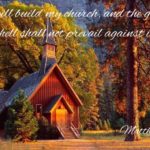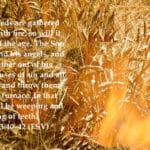True Food and True Drink from Heaven
Numbers 11:4-13; John 1:14; 6:51-59 (text)
November 29, 2015 • Download this sermon (PDF)
Congregation of Christ: Today, we start the season of Advent this year 2015. Advent is a time of remembering and giving thanks to God for his most precious gift: Jesus his only-begotten who was born a true human baby to save his people from their sin.
Advent and Christmas are two of the most cherised and beautiful Christian traditions. However, every Advent season, there are naysayers, many coming from Reformed circles, that Christmas, or any other day, should not be commemorated with special worship services. They cite the 16th and 17th century Puritans who rejected these other “holy days.” They argue that the 16th century Protestant Reformers also rejected these special days of worship, saying that the only day of worship is the Lord’s Day. Others say that these special days violate the Regulative Principle of Worship. And some even contend that these special days have been so corrupted and commercialized that Christians should not have any part of it.

But most other Reformed pastors disagree. First, the early German Reformers where the Heidelberg Catechism was written prescribed services on Christmas, Easter, Ascension and Pentecost, while also allowing Good Friday. This was also adopted by the Dutch Reformers, and many other non-Puritan Reformers. Second, even in our worship services on these special days, we do not add entertainment or innovations to the elements of prayers, songs and preaching. We do not violate the regulative principle. Third, the corruption and commercialization of these special days do not make them unlawful. As we have seen in the cleansing of the Temple courts by Jesus, even the solemn feast of Passover was corrupted and commercialized, Jesus was in attendance. Moreover, Jesus attended even those feasts that were not commanded by God to Israel, e.g., an unknown feast in John 5:1 and the Feast of Dedication or Hanukkah in John 10:22.
There are other benefits to our observance of Christmas. The first is that it is a reminder of God’s overall salvation plan, beginning with Christ’s birth, then his crucifixion, resurrection and ascension. Second, the birth of Christ has a major part in the Scriptures. It was prophesied by Moses, the psalmists, and the prophets. Matthew and Luke devoted 2-3 chapters of their Gospels to the birth of Jesus. Third, it confirms to us the historical fact of the Son of God assuming human flesh and blood to save his people from sin. The birth of Jesus was not a fictional tale of a cute baby born in a manger, announced by angels with harps to warm our hearts. Fourth, our Advent series today and in these next three Sundays is a fitting opportunity to get our unbelieving family and friends to hear the gospel of salvation through faith alone in Christ alone. Jesus used the Jewish feasts as opportunities to preach the gospel of salvation to the Jews. Today, we can invite family and friends to our church on two most important days of the Christian year: Christmas and Easter.
But before we get to our text for today, it must also be pointed out that Christmas is not pagan, nor is December 25 set by the Roman Catholic Church. December 25 was not an accommodation to a pagan festival on the winter solstice to honor the Sun-god. Rather, it was calculated as the actual historical date of Jesus’ birth since the early church (Hippolytus in the 2nd century and Chrysostom in the 4th century). Church historians note that the connection between December 25 and pagan festivals was not intentionally set until the 12th century when Christianity spread to pagan northern and western Europe. So we see that many of the Christmas trappings we have today come from these cultures, such as mistletoe, Yuletide, and Santa Claus and his reindeer.
But now we come to our text. This passage is part of Jesus’ conversation with an audience of Jews and his own disciples. In John’s Gospel, Chapter 6 includes the feeding of the 5,000, Jesus walking on water, and his bread of life discourse during his second trip to Jerusalem for the feast of Passover. Again, his intention was to reveal himself as the fulfillment of a Jewish institution that was passing away. Remember that Moses led the Israelites out of Egypt on the night of the first Passover event. When they reached the wilderness, the people started grumbling for food and water that they had when they were back in Egypt. Numbers Chapter 11, which we read, describes the grumbling of the people and Moses’ frustration with them. So Jesus tells them that he, not the manna from heaven or the water from the rock, is True Food and True Drink who comes from heaven.
Today, our theme is: “True Food and True Drink from Heaven” under four headings: (1) True Food and True Drink Explained; (2) True Food and True Drink Misunderstood; (3) True Food and True Drink Rejected; and (4) True Food and True Drink for His Disciples.
To read the complete sermon, click here.



